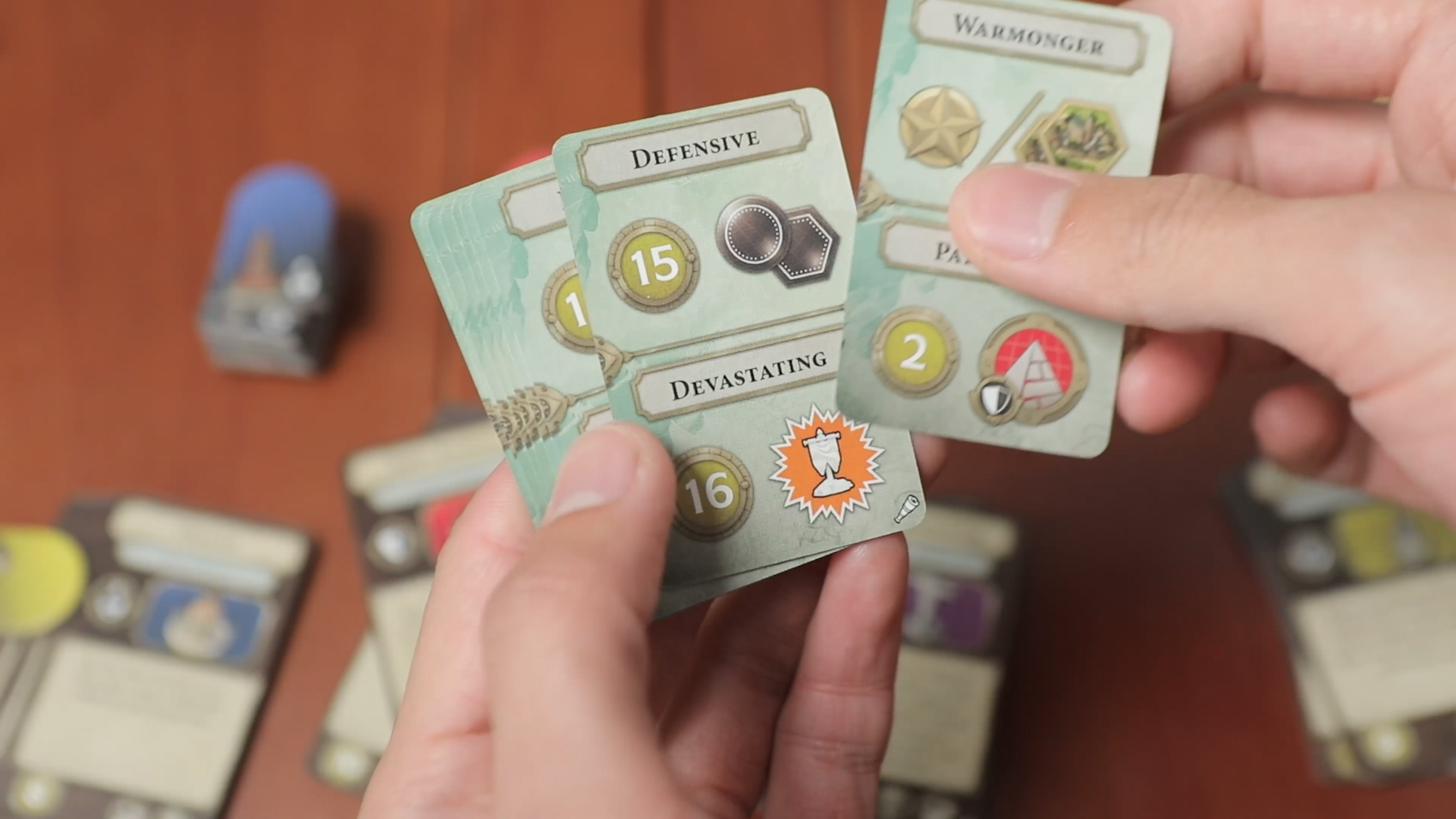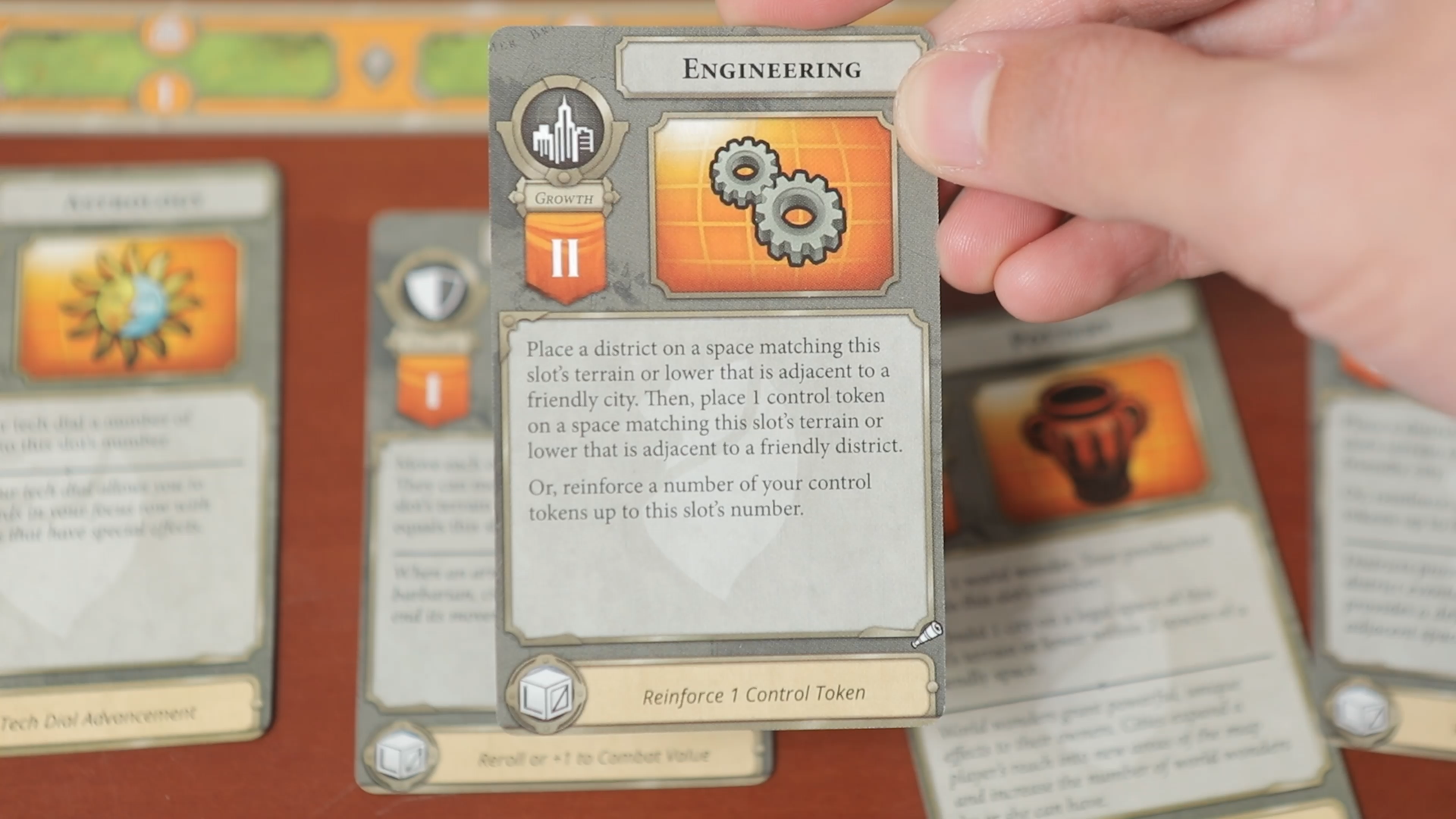Sid Meier’s Civilization: A New Dawn Review
A racing game that is not Civilization.
Play as civilizations, competing to finish 4 randomized objectives while researching new tech, expanding influence on the board, and building wonders. Reviewed with the Terra Incognita expansion, bumping playtime to 2-3 hours, for 2-5 players.
Video published May 27th, 2022

Expand across the board, being wary of Barbarians.

Race to fulfill either side of 3 randomized objectives, then 2 map specific ones.

Upgrading technology directly improves actions.
Overview & How to Play
This is labeled Sid Meier’s Civilization, so everyone controls a civilization! Like the Japanese, or Americans.
In A New Dawn, You’re trying to achieve 4 out of the 5 win condition cards, that could include having a certain amount of Wonders, resources, or having a really strong battle result. 2 out of those cards involve something called ‘Forts’ on the map, which are arenas you have to initially conquer, then keep holding to maintain the card.
Every turn, all players do is choose one action from cards in front of them, called Focus Cards. These are in a ‘Focus Row’, where the higher your card is on that row, the stronger its activation will be, then it resets all the way to the front, and the untriggered cards slide to the right if they can. That is one turn of A New Dawn! Just choosing a single action.
Attacking is similarly simple, with just moving troops that is activated through a specific Focus Card. But A New Dawn does something special with terrain- it actually slows down movement. Plus, when troops attack, they take into account terrain for defensive bonuses.
There is also exploring, where players spend one movement to explore from any home tile.
The game really isn’t too complicated structure wise, that’s basically it, just do one action a turn from your Focus Row until someone reaches 4 objectives.
Pros
Actually, we have to go back to this Focus Row system, which is one of the key ingredients of this game’s streamlined-ness. It’s a smooth way to get players thinking ahead about certain turns, as they realize that bottom actions they DON’T do, move up. Each card you trigger has real consequences on later turns as you play the puzzle of optimizing what card to use at what point in your row, and when.
A New Dawn also gives players a highly interactive world to play around with. There’s Barbarians on the map that move on their own and can attack players, neutral city-states to trade with for new abilities, and the Forts to conquer.
Terrain really matters in A New Dawn, where mountains and deserts will feel like appropriate roadblocks for a growing civilization. Exploring the map also gives way more options for players to expand in, and gives more terrain combinations in general.
The coolness of this civilization world is hammered in through the World Wonders. These buy-able cards, that become featured in one of your cities, grant some bananas abilities. Like, The Great Lighthouse will let you start building cities on the edge of the map! Or there’s a Jesus statue (the one in Rio de Janeiro) letting you literally replace enemy cities after you buy it.
This Sid Meier’s Civilization just has this satisfying progression of expanding your… civilization! Everyone has more opportunities through building more cities, which expands the potential areas they can build, or spawn units from. Upgrading tech means upgrading your Focus Cards, which means individual actions are just stronger. Then the game has external abilities that start to stack up: getting multiple World Wonders, diplomacy cards, and even having natural wonders.
Replayability is also straight insane. There’s 18 factions with the expansion, with a total of 10 objective cards to be mixed and matched. Really, in every game, you’re doing a different part of the giant chunk that’s included, because of all the different strategies victory cards demand.
Cons & Nitpicks
Civilization: A New Dawn, with the Terra Incognita expansion has a lot of problems though. First of all, the game just doesn’t handle randomness well. See, even with the expansion that adds exploration, armies, and Fort victory conditions, the game is still fundamentally a streamlined, tight Euro. Now, it still runs fast, but has punishing randomness everywhere. The RNG sneakily causes players’ win clocks to constantly move ahead or behind by a few turns to cause predetermined wins.
This umbrella of poor randomness handling is BIG. Randomly grabbed tiles for exploration can get wonky where dead zones can exist to mess with plans, or how new tiles can spawn Barbarians, which move and can destroy players’ cities. Barbarians aren’t the easiest to kill, and killing them hardly grants any reward.
Or how about, winning combats against forts is incredibly swingy, where if you win, you get a literal victory condition, and a city on the fort space. This is done through just rolling a D6, and if this fight happens to be lost, a failed attack is flushing an entire turn down the toilet, on top of having to wait a bunch of turns to do it again because of how the Focus Row works, putting you strictly behind.
Oh, and then how good your starting tile is can be all over the place, but you see it AFTER you pick your faction, well that’s not good. So you’re telling me that if I pick a highly map reliant faction like America, I have no idea whether I’ll be able to get the Natural Wonders that let me trigger my ability?
You may be asking, huh, that’s weird, but exploration and random battle outcomes are supposed to be in civilization right? Well, usually games with powerful emergent randomness mitigates those advantages and/or snowballing through politics, which A New Dawn just doesn’t really have, especially in how fast it is.
This gets worse in how the game’s win conditions and factions have balance that is all over the place, where certain combinations are just way too easy. Namely, getting Wonders is just too easy in this game, where if you capture a Fort early, you instantly have a second city to host a second Wonder. We harp on this unbalance a LOT because the game NEVER changes player order, and the game ends when a player reaches 4 objectives first, you just gotta play out the rest of that round. Going first can give someone first pick to new, or recently cheaper Wonders, can give them the early attack against neutral Forts, get resources on the map before you, etc. etc. It’s especially brutal because you can never take away others’ win conditions EXCEPT for Forts, but it can be hard to stop someone from maintaining a Fort lead because you have to walk across the map to attack those Forts, and terrain restrictions are a thing.
This actually gets us perfectly to how this game tends to discourage player interaction. Yep, the reason why taking other players’ Forts is not commonplace is that players are already not in the mindset of attacking others. Attacking others usually doesn’t advance your goal of objectives. Oh, and exploration has players exploring AWAY from each other.
A substantial amount of the expansion additions are actually just not healthy to the game. Forts break certain victory conditions, there’s Government tokens that allow players to easily cheese certain Focus Cards, and unique faction Focus Cards don’t really add anything to the game.
Games of Civilization: A New Dawn end up having very low adaptation to anyone else, as you just rush objectives and aren’t incentivized to stop anyone else, since that strictly slows down your engine with its only one simple action a turn. It really does feel like you’re just waiting for everyone else to take their turn.
Oh, and huge warning: starting accessibility is ridiculously awful if starting with base game and expansion at the same time. The expansion overhauls a lot of the rules of the original, while never giving a clear destination to look up rules. Rulebook dual-wielding happens a lot here.














